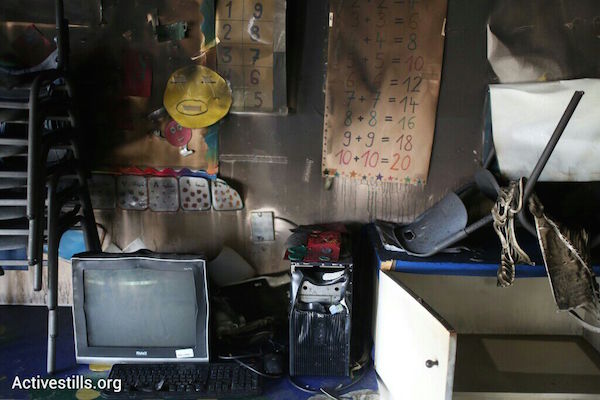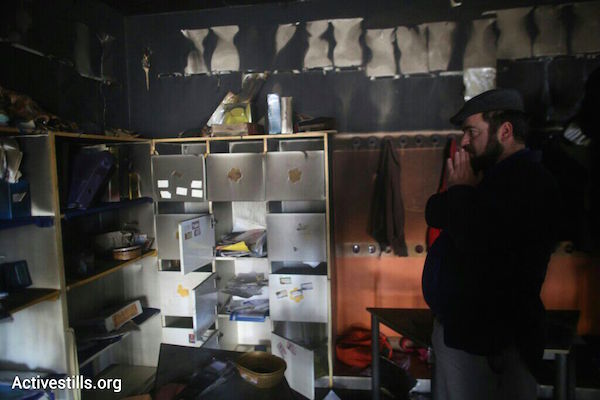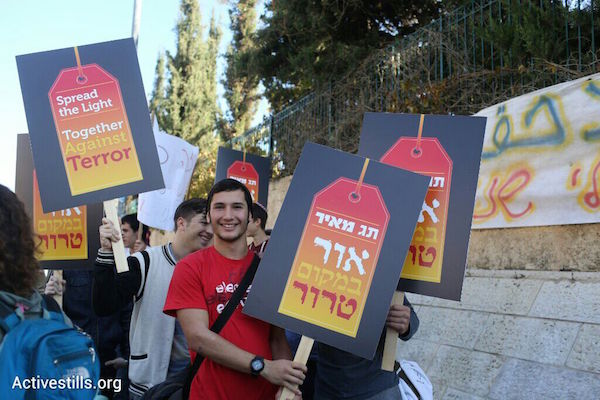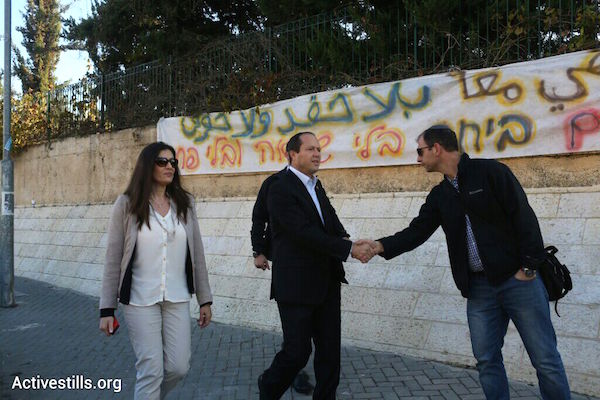The mixed Jewish-Arab school has been the target of racist attacks in the past, but for the parents, students and teachers of the ‘Hand in Hand’ school, this feels different. ‘This time, the fire was ignited inside our home.’

The timing couldn’t have been more “perfect”: while I was still at a demonstration against the “Jewish Nation-State Law” outside the Prime Minister’s Office, I got a message saying that the bilingual school was set on fire. Here we were demonstrating against political arson, and not too far away someone is already doing it with gasoline and matches. This time, the fire was ignited inside our home.
The smell of fire is still very strong in the parking lot across from the school. Slowly slowly, parents, teachers, students and recent graduates begin to arrive. Nobody is in a hurry to go inside, as if we fear actually seeing what we expect there, all while we’re still trying to figure out exactly what happened and the extent of the damage. “A first grade classroom was completely burned,” somebody says, “and the other first-grade classroom sustained serious damage, too.” The blood drains from our faces. They burned the first-grade classrooms? The classrooms in which children for the first time in their lives scribbled letters into words: “love, friendship, respect?”
We later learn that the arsonists threw all of the books that they found in the classrooms into a pile and burned them. The image is too difficult to even fathom, and a part of me is relieved that firefighters and police have cordoned off the burned classrooms and aren’t letting anyone in. Who can rid such an image from their head — a burned first-grade classroom?


Within an hour the school is bustling with people. Among the police officers, firefighters, people from the Jerusalem education bureau and other officials, are the rest of us: teachers, students and school staff. You can see the shock on our faces. I recognize a student who graduated last year and who lives on the other side of the city; I ask her what she’s doing here. “Since the Gaza war and everything that’s been happening in Jerusalem recently, I feel like I’m losing hope. I felt like everything that we built here over the past 12 years has been destroyed in two months. But anyway, the moment I heard that the school had been burned, I ran to come here. That’s something that never changes, it seems. This is home. I grew up here. They’re destroying my home. We fight over the land but this is my land. This school is my land.”
An outsider wouldn’t understand it, the deep feeling of belonging. That’s how it always works here: when it gets tough, we want to be together. Jut like during the war when we marched along the light rail tracks every week, and when it was important to make sure that the sane voice of Jerusalem was heard, but also when we just wanted to be together. And also now, as we shake off the feelings of helplessness and get ready for action: preparing alternate classrooms for those that were burned, making colorful banners for the first graders to see when they arrive in the morning, hanging signs in the hallways, cleaning, organizing. Home.

As we get to work, we are reminded of other episodes in our history in which the school faced harassment: that time that they went into the lower classes and covered with glue all of the desks that bore names of Arab children; or in the school’s previous building when they slid burning pieces of paper under the doors in a more symbolic act of arson. All of the hateful and garbled graffiti sprayed on our walls over the years. And despite all that, we understand that this time it’s different. The children wander around with their parents looking especially worried. “Nadia, will there be school tomorrow?” a young student asks one of the school’s co-directors. “Of course there will be,” Nadia answers confidently with a big smile. “Not only will there be school but you need to finish your homework!”
Meanwhile, statements of condemnation and support start to come in, and people begin organizing various rallies in solidarity and support for the next day. We go home knowing that we will meet here again in just a few hours.
This morning, we knew we better arrive early ahead of the tumult that would certainly await us at the entrance of the school. Indeed, hordes of reporters and photographers assembled at the entrance. A burned school is a big story, it seems. We manage to usher the children into the school and then wait outside for the supporters who were supposed to arrive. Somebody mentions that it feels like a shiva (a Jewish mourning ritual) — receiving mourners, awaiting consolation calls.

And they came. Throngs of them came. The wonderful people from anti-racism group Tag Meir arrived, students and representatives of some other schools in the city also came, people from wider social circles, and other women and men who chose to spend their morning with us, in solidarity. An especially touching moment was when we saw a large group of youths chanting as they approached, and after our initial instincts — based on experience — made us shrink into a moment of fear, they got closer and we heard what they were chanting: “Jews and Arabs refuse to be enemies.” It turned out that the neighboring “Rainbow School” canceled its classes so its students could come and support us. It’s hard to describe just how touching it was.
And the politicians came too, of course: MKs Nahman Shai and Erel Margalit, Justice Minister Tzipi Livni and Jerusalem Mayor Nir Barkat, who condemned the crime and called to restore routine to the city.

I appreciate that Mayor Barkat came to visit the school — and I say that without any cynicism. It was the right thing to do and it was necessary. Once upon a time, during the weekly protests in Sheikh Jarrah, we used to say, “there’s nothing holy in an occupied city.” Today I want to tell Barkat: there isn’t anything routine in an occupied city. A routine of occupation and violence is a routine of iniquity. You can condemn the torching of a school as much as you want, but when 40 percent of the city’s residents under your jurisdiction live a daily war zone, there’s nothing routine about that. When the daily routine of over 350,000 people in the city you run is a routine of daylight robbery, of violent police raids, of sponge-tipped bullets and arrests, of “skunk” trucks that spray putrid water on homes and schools, that’s not a routine we want to adopt. When the students in our school must leave their homes two hours before school in order to travel a distance that should take only 20 minutes because their neighborhood is barricaded and blocked with concrete blocks, when our students breath in tear gas in their homes each week and come to school from a daily war zone, we won’t join your calls to restore routine.
The routine in your city is one of iniquity, Mr. Barkat. Our school’s community is strong and vibrant. We demand, of course, that you and your leadership provide our students with protection from the increasing violence. But like always, we will be doing the repairs and rehabilitation by ourselves, with the strength we draw from our moral high ground and the civil and social solidarity we’ve built. We will overcome. You, Mr. Barkat, go see to the well being of the city you have been entrusted with managing. And if you need inspiration — moral, ethical or from the community — you are always welcome to come visit the bilingual school. We will keep going it alone here, free from fear and hatred.
This article was first published on +972’s Hebrew-language sister site, Local Call. Read it in Hebrew here.
Related:
Jerusalem mixed school set on fire in apparent arson attack
Investigation of Abu Khdeir murder tainted by racism, police incompetence

